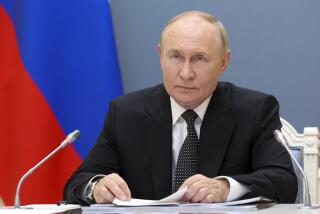The Real Threat From Russia : Crime is exploding, prompting international control efforts
- Share via
The biggest threat to international security coming from Russia these days, in the view of many concerned specialists, isn’t military but criminal.
Since the Soviet Union’s collapse 30 months ago organized crime has become Russia’s major growth industry. The head of the organized crime control section of the Ministry of Internal Affairs in Moscow says nearly 5,700 criminal groups with about 100,000 members have been identified so far. Mikhail Yegorov warns that the activities of these gangs threaten Russia’s economic and social life. They threaten more: Gangs rooted in Russia or one of several other former republics of the Soviet Union now operate in 29 countries, including the United States. The danger to American interests is serious enough that the FBI will soon open its first permanent office in Moscow.
At the top of the list of the FBI’s concerns, Director Louis J. Freeh told Congress the other day, is that Russian criminal gangs might be able by theft or purchase to acquire nuclear or other weapons of mass destruction or the means for making them. Such weapons could then be sold to terrorist groups or to governments that have not scrupled before to engage in terrorist acts--Iran, Iraq, Libya or North Korea, most prominently. So far, Freeh said, no “serious diversion” of weapons-grade nuclear materials has taken place. But significant amounts of “relatively low-grade nuclear materials” smuggled out of Russia have turned up in Europe and Asia.
The end or at least the easing of police repression in Russia and the chaotic conditions invited by an erosion of central control have opened fertile fields in which organized crime has been able to flourish. Extortion, kidnaping, drug trafficking, money laundering, smuggling, murder and other serious crimes have become commonplace. Just a few weeks ago, an outspoken anti-crime parliamentarian was assassinated in Moscow. Russian gangs, Freeh says, have forged ties with organized crime in Italy, Colombia and a number of Asian countries.
The Russian Internal Affairs ministry’s Yegorov has called for greater international cooperation to combat the growing menace. Washington is willing. Next month Freeh and other U.S. officials plan to visit Russia to talk about improving information exchanges. Germany is urging improved anti-crime coordination through Interpol.
There’s nothing merely symbolic in such efforts. Organized crime and the official corruption that everywhere accompanies it represent an unmistakable threat to Russia’s chances for stability and economic development. And washing over Russia’s borders, crime poses a new challenge to the security of other countries.
Greater international cooperation to deal with this menace isn’t just an option but an urgent necessity.
More to Read
Sign up for Essential California
The most important California stories and recommendations in your inbox every morning.
You may occasionally receive promotional content from the Los Angeles Times.













